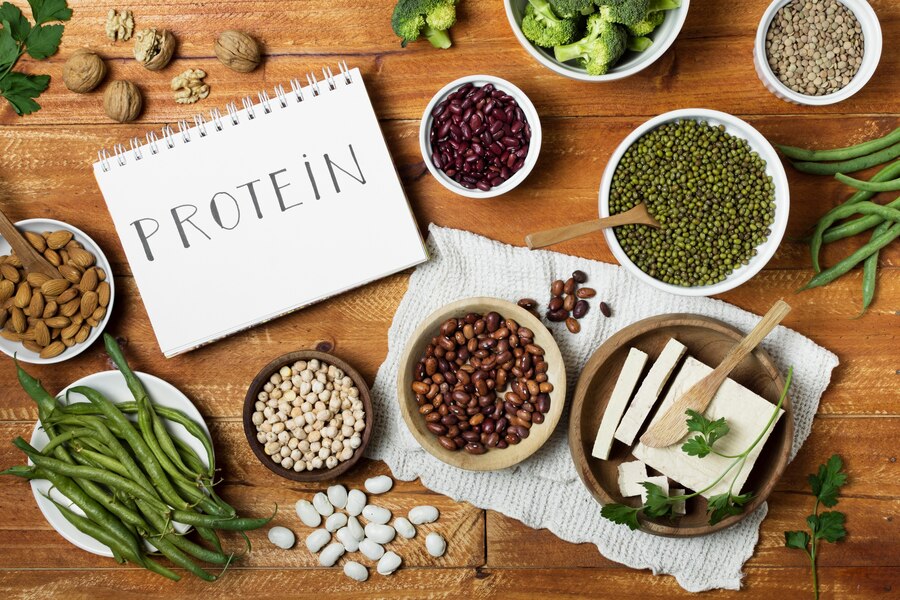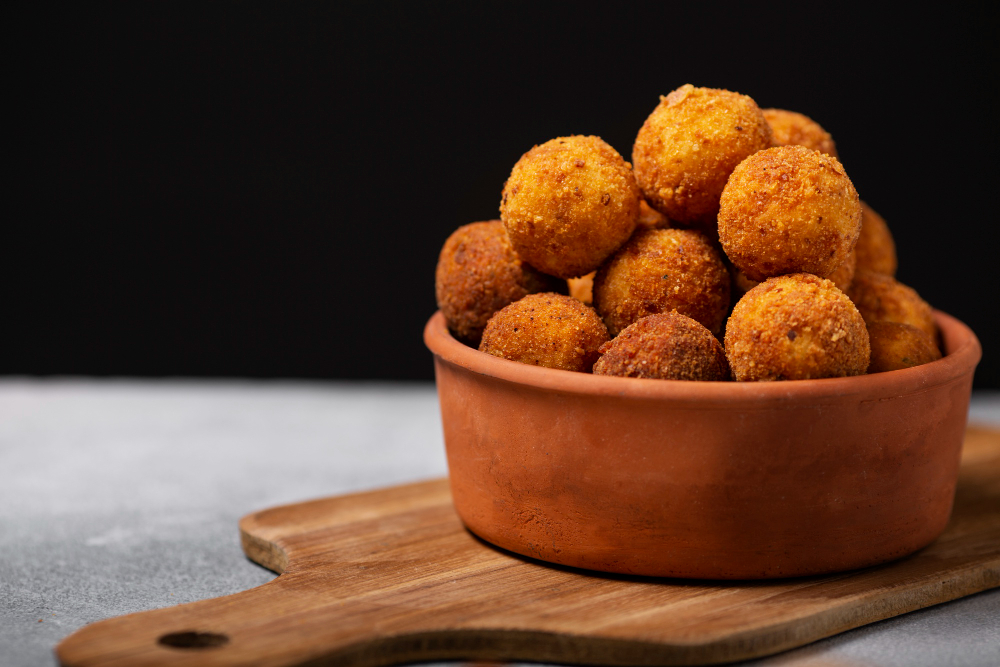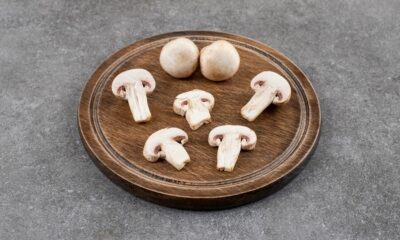Food And Drinks
Develop a Healthy Lifestyle with High Protein Vegan Food

Making healthier food choices can make your body immune to different types of seasonal and chronic diseases. Adding a high-protein vegan diet to your food habits can change your lifestyle for the better. At the current times, especially in this post-COVID situation, people are leaning more and more towards developing a healthy lifestyle with proper food habits. With time, health concerns are also increasing due to work stress daily life pressure and other crucial matters. In this situation, it is important to focus on our well-being and deal with the concerning health issues. Adding high-protein vegan food to your diet can be a good start. Let’s check out how beneficial vegan food can be for our health.
Health Benefits of High-Protein Vegan Foods
- Metabolic health improvement: A survey from 2019 showed that about 88% of people in the United States were suffering from poor metabolic health. The number is indeed concerning. Consuming high-protein Vegan food daily can improve the metabolism system and promote better glycemic control. This can also reduce the chance of Type 2 Diabetes.
- Helps to repair and grow muscle: If you are an athlete, fitness enthusiast or simply someone interested in keeping a fit body, consuming high-protein food is a must. Consuming high-protein vegan food assists in your muscle repair and growth, It keeps you healthy and fit without causing any kind of metabolic issue.
- Helps in weight management: keeping your weight in check is an important factor at the current times. An increasing number of people are suffering from obesity all around the world, especially in the United States. Child obesity in the US is becoming concerning. Plant protein is low in calories and high in energy. Including a high-protein plant-based food diet can help you in weight management.
- Lower risk of diseases: Food habit plays a crucial role in causing some specific diseases. Research shows that a high-protein plant-based diet can reduce the chances of coronary heart diseases and cancers. Daily consumption of plant-based food can also lower the risk of chronic diseases.
- Improves nutrient intake: High-protein vegan foods include different types of legumes, nuts, seeds, fruits and vegetables that are high in vitamins, minerals and fibre. These nutrients improve your health and ensure your well-being in the long run. So, if you are trying to have a proper diet, choose your protein carefully.
How to Add High-Protein to Your Vegan Diet
Creating a high-protein vegan diet can be complicated sometimes. Here are some tips that you can use to develop the habit.
- Breakfast is the most important part of your diet. Add protein-rich smoothies from fruits and vegetables or protein powder to your breakfast. You can also add tofu scrambles along with the smoothies.
- Make sure to add protein-rich vegan foods to your every meal. For example, salad for breakfast, lentils for lunch and tofu for dinner. The choice is yours.
- Instead of unhealthy and oily snacks choose healthier options like nuts and seeds. It will keep you full for a long time.
Food And Drinks
5 Cinco de Mayo Drinks to Spice Up Your Fiesta

Ever wondered why margaritas dominate Cinco de Mayo celebrations? While this iconic drink is a staple, there’s a whole world of vibrant, flavorful beverages that can elevate your fiesta. Whether you’re hosting a party or simply want to enjoy a festive drink, we’ve got you covered with expert-backed recipes, modern twists, and must-try classics.
Let’s dive into the best Cinco de Mayo drinks—beyond the basic margarita—that will impress your guests and keep the celebration lively!
1. The Classic Margarita (With a Twist)
No Cinco de Mayo is complete without a margarita, but why stick to the ordinary?
Why It Works:
-
Balanced flavors – The perfect mix of sweet, sour, and salty.
-
Customizable – Swap tequila for mezcal for a smoky twist.
Recipe:
-
2 oz reposado tequila
-
1 oz fresh lime juice
-
½ oz triple sec
-
½ oz agave syrup
-
Salt rim (optional)
Pro Tip: Use chili salt for an extra kick!
2. Paloma: Mexico’s Most Popular Cocktail
Move over, margarita—the Paloma is Mexico’s true favorite.
Why It Works:
-
Refreshing & light – Grapefruit soda (like Jarritos or Squirt) keeps it bubbly.
-
Easy to batch – Perfect for parties.
Recipe:
-
2 oz blanco tequila
-
½ oz lime juice
-
Grapefruit soda (to top)
-
Salt rim (optional)
Upgrade It: Use fresh grapefruit juice + club soda for a less sweet version.
3. Michelada: The Ultimate Beer Cocktail
If you love spicy, savory drinks, the Michelada is a must-try.
Why It Works:
-
Umami-rich – Combines beer with lime, hot sauce, and spices.
-
Hangover helper – The electrolytes from the spices help recovery.
Recipe:
-
1 bottle Mexican lager (e.g., Modelo or Victoria)
-
1 oz lime juice
-
2 dashes hot sauce (Valentina or Cholula)
-
½ tsp Worcestershire sauce
-
Tajín rim
Spicy Version: Add a splash of Clamato for a Chelada.
4. Horchata RumChata Cocktail
For a sweet, creamy alternative, try this spiked horchata.
Why It Works:
-
Dessert-like – Cinnamon and vanilla flavors pair perfectly with rum.
-
Non-tequila option – Great for those who prefer something different.
Recipe:
-
1.5 oz RumChata
-
1 oz vanilla vodka
-
1 oz horchata (store-bought or homemade)
-
Cinnamon sprinkle
Frozen Version: Blend with ice for a milkshake-style treat!
5. Mezcal Mule (A Smoky Alternative)
If you love Moscow Mules, this Mexican-inspired version will blow you away.
Why It Works:
-
Mezcal’s smokiness adds depth to the classic ginger-lime combo.
-
Copper mug optional – Serve over ice for simplicity.
Recipe:
-
2 oz mezcal
-
½ oz lime juice
-
4 oz ginger beer
-
Candied ginger garnish
Extra Kick: Add a dash of chili powder to the rim.
Bonus: Non-Alcoholic Agua Fresca
Not drinking alcohol? No problem! Agua fresca is a refreshing, fruity alternative.
Why It Works:
-
Naturally sweet – Made with fresh fruit and water.
-
Kid-friendly – Perfect for all ages.
Recipe:
-
2 cups chopped watermelon (or pineapple, mango)
-
1 cup water
-
1 tbsp lime juice
-
1 tsp honey (optional)
Blend, strain, and serve over ice!
Final Thoughts: Which Drink Will You Try?
Cinco de Mayo Drinks are all about bold flavors and festive vibes. Whether you’re sipping a spicy Michelada, shaking up a mezcal mule, or keeping it classic with a margarita, these drinks will make your celebration unforgettable.
Pro Hosting Tip: Set up a DIY drink station with different rims (salt, Tajín, chili powder) and let guests customize their cocktails!
Food And Drinks
Crispy Potato Balls Recipe: The Ultimate Comfort Food Snack

Ever crave a crispy, golden snack that’s creamy on the inside and perfectly crunchy on the outside? Potato balls are the answer! Whether you know them as croquettes, aloo balls, or papas rellenas, these bite-sized delights are a universal favorite.
In this guide, you’ll learn how to make restaurant-quality potato balls at home—crispy on the outside, fluffy inside, and packed with flavor. We’ll cover expert tips, variations, and even how to store them for later. Let’s get cooking!
Why You’ll Love This Potato Balls Recipe
✔ Easy to make – Uses simple, pantry-friendly ingredients.
✔ Versatile – Customize fillings (cheese, meat, herbs, or spices).
✔ Crowd-pleaser – Perfect for parties, snacks, or meal prep.
✔ Kid-friendly – A fun way to sneak in veggies or protein.
Ingredients You’ll Need
For the Potato Mixture:
-
4 large potatoes (Russet or Yukon Gold)
-
2 tbsp butter (or olive oil for dairy-free)
-
¼ cup milk (or plant-based milk)
-
½ tsp salt (adjust to taste)
-
¼ tsp black pepper
-
¼ tsp garlic powder (optional)
For the Filling (Optional but Delicious!):
-
½ cup shredded cheese (cheddar, mozzarella, or pepper jack)
-
¼ cup cooked bacon, ham, or ground beef
-
2 tbsp finely chopped herbs (parsley, chives, or cilantro)
For Breading & Frying:
-
1 cup breadcrumbs (panko for extra crunch)
-
½ cup all-purpose flour
-
2 eggs (beaten)
-
Oil for frying (vegetable, canola, or air-fryer option)
Step-by-Step Instructions
1. Prep the Potatoes
-
Peel, chop, and boil potatoes until fork-tender (~15 mins).
-
Drain well, then mash with butter, milk, salt, and spices until smooth. Let cool.
Pro Tip: Overcooked potatoes can get gluey—stop when just tender!
2. Shape the Potato Balls
-
Scoop ~2 tbsp of mashed potatoes, flatten slightly, and add filling (cheese, meat, etc.).
-
Roll into smooth balls (about 1.5-inch diameter).
Pro Tip: Wet hands slightly to prevent sticking.
3. Bread for Crispiness
-
Roll each ball in flour → dip in beaten egg → coat with breadcrumbs.
-
Chill for 15 mins (helps them hold shape while frying).
4. Fry to Golden Perfection
-
Heat oil to 350°F (175°C).
-
Fry in batches for 2-3 mins until deep golden brown.
-
Drain on a paper towel.
Alternative Cooking Methods:
-
Air Fryer: Spray with oil, cook at 375°F for 10-12 mins, flipping halfway.
-
Baked: Brush with oil, bake at 400°F for 20-25 mins.
5 Expert Tips for the Best Potato Balls
-
Use Starchy Potatoes – Russets or Yukon Golds hold shape better than waxy varieties.
-
Keep the Mixture Dry – Excess moisture = soggy balls. Drain potatoes well!
-
Double-Breading Trick – For extra crunch, dip in egg and breadcrumbs twice.
-
Freeze for Later – Freeze before frying, then cook straight from frozen (add 1-2 mins frying time).
-
Serve with Dipping Sauces – Try garlic aioli, spicy ketchup, or sour cream.
Creative Variations to Try
-
Loaded Potato Balls – Add bacon bits, cheddar, and green onions.
-
Spicy Version – Mix in jalapeños or chili flakes.
-
Veggie-Packed – Fold in finely chopped spinach or corn.
-
Sweet Twist – Swap salt for cinnamon, stuff with Nutella or jam.
Final Thoughts: Crispy Potato Balls Recipe
Crispy Potato Balls Recipe, creamy, and endlessly customizable—making them a foolproof snack for any occasion. Whether you fry, bake, or air-fry them, they’re guaranteed to disappear fast!
Now it’s your turn: Which filling will you try first? Cheese? Spicy beef? Or maybe a sweet surprise? Drop your favorite combo in the comments!
FAQs About Crispy Potato Balls Recipe
Can I make these ahead?
Yes! Prep and refrigerate for up to 24 hours or freeze for 3 months.
Why do my potato balls fall apart?
Potatoes may be too wet, or breading wasn’t packed tightly. Chill before frying.
Can I use sweet potatoes?
Absolutely! Adjust spices (try paprika or cumin for a savory twist).
Food And Drinks
Creamy Tuscan White Bean Skillet: A Comfort Food Masterpiece

Ever crave a restaurant-quality meal but dread the long prep time? Imagine a dish that’s creamy, garlicky, packed with protein, and ready in 20 minutes. That’s the magic of a Creamy Tuscan White Bean Skillet—a one-pan wonder that’s hearty, healthy, and bursting with Italian-inspired flavors.
Whether you’re a busy parent, a meal-prep enthusiast, or just someone who loves rich, comforting food, this dish delivers. Let’s break down why it’s a must-try, how to make it perfectly, and expert-backed tips to elevate it.
Why This Dish Works (Nutrition & Flavor Science)
Before diving into the recipe, let’s explore why this skillet meal is a nutritional and culinary powerhouse:
✅ Plant-Based Protein Punch – White beans (like cannellini) offer 15g protein per cup, plus fiber for lasting energy.
✅ Healthy Fats – Olive oil and a touch of cream (or dairy-free alternatives) provide satiating fats without heaviness.
✅ Umami & Depth – Sun-dried tomatoes, garlic, and Parmesan (or nutritional yeast) create a savory, complex flavor profile.
✅ Quick & Adaptable – Works as a main dish, side, or meal-prep staple—gluten-free, vegetarian, and easily veganized.
“Beans are one of the most underrated superfoods—they’re affordable, shelf-stable, and incredibly versatile.” — Dr. Mark Hyman, Functional Medicine Expert
The Ultimate Creamy Tuscan White Bean Skillet Recipe
Ingredients (Serves 4)
-
2 tbsp olive oil
-
4 garlic cloves, minced
-
1 shallot (or small onion), diced
-
1 tsp Italian seasoning
-
½ tsp red pepper flakes (optional)
-
2 cups cooked white beans (or 1 can, drained)
-
½ cup sun-dried tomatoes, chopped
-
1 cup baby spinach (or kale)
-
½ cup vegetable broth
-
¼ cup heavy cream (or coconut milk for vegan)
-
¼ cup grated Parmesan (or nutritional yeast)
-
Salt & pepper to taste
-
Fresh basil or parsley for garnish
Step-by-Step Instructions
1️⃣ Sauté Aromatics – Heat olive oil in a skillet. Add garlic, shallot, Italian seasoning, and red pepper flakes. Cook until fragrant (1-2 min).
2️⃣ Add Beans & Sun-Dried Tomatoes – Stir in white beans and sun-dried tomatoes. Let them soak up the flavors (2-3 min).
3️⃣ Deglaze & Simmer – Pour in broth, scraping up any browned bits. Add spinach and cook until wilted.
4️⃣ Creamy Finish – Reduce heat, stir in cream and Parmesan. Simmer until slightly thickened (3-4 min).
5️⃣ Garnish & Serve – Top with fresh herbs and a drizzle of olive oil. Pair with crusty bread or over pasta.
Pro Tips for the Best Results
1. Bean Choice Matters
-
Cannellini beans are classic, but Great Northern beans or even chickpeas work.
-
For creamier texture, mash a few beans before adding liquid.
2. Flavor Boosters
-
Lemon zest brightens the dish.
-
Miso paste (½ tsp) adds umami depth.
-
Crispy pancetta (or mushrooms) for a meaty twist.
3. Meal-Prep Friendly
-
Stores well for 3-4 days in the fridge.
-
Freezes beautifully—just omit dairy and add it fresh when reheating.
Why This Skillet Beats Takeout
-
Cost-Effective – A fraction of the price of restaurant meals.
-
Customizable – Swap in seasonal veggies (asparagus, zucchini).
-
Fast Cleanup – One pan = less mess.
“The combination of fiber, protein, and healthy fats in this dish helps stabilize blood sugar, making it a great balanced meal.” — Nutritionist Kelly LeVeque
Final Thoughts: A Dish You’ll Make Weekly
The Creamy Tuscan White Bean Skillet is proof that simple ingredients can create extraordinary meals. Whether you need a quick weeknight dinner or an impressive dish for guests, this recipe delivers.
Try it tonight and taste the magic of Tuscan comfort—without the fuss.
-

 Articles3 months ago
Articles3 months agoHow Many Times Can You Regrow Green Onions
-

 News11 months ago
News11 months agoUnderstanding HotLeaks: What You Need to Know
-

 Fashion8 months ago
Fashion8 months agoOpals in the USA: A Gemstone Transforming the Crystal Healing Market
-

 Entertainment8 months ago
Entertainment8 months agoHow to Use Snaptik: A Complete Guide to Download TikTok Videos
-

 Technology1 year ago
Technology1 year agoThe Wonders of Oh Em Gee Blog
-

 Entertainment1 year ago
Entertainment1 year agoBare it All: Unforgettable Skinny Dipping Stories Shared
-

 Health1 year ago
Health1 year agoCan You Smoke Shrooms? Exploring the Myths and Realities
-

 Articles5 months ago
Articles5 months agoWHAT IS THE DIFFERENCE BETWEEN SEED GARLIC AND FOOD GARLIC?
